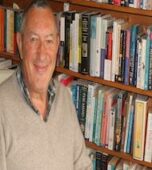Therapists that treat Seniors in Tranent, Scotland Scotland, United Kingdom GB
We are proud to feature top rated therapists that treat Seniors in Tranent, Scotland, United Kingdom. We encourage you to review each profile to find your best match.
Mario Uosis-Martin
Counsellor/Therapist, PGDip (Level 7) Advanced Psychotherapy
Are you in search of a therapist who is warm, understanding, and empathic? If you're looking for an open and non-judgmental therapeutic space, you've come to the right place. I specialise in addressing a range of issues, such as anxiety, stress, depression, relationship challenges, climate-eco distress, and the effects of childhood trauma, to name a few. Let's initiate a conversation; reach out today.
For more information, visit my website: https://www.therapywithmario.com
I hold a Postgraduate Diploma (Level 7) in Advanced Psychotherapy. Using an integrative approach, I tailor my therapeutic methods to meet the unique needs of each client.
6 Years Experience
Online in Tranent, Scotland (Online Only)
Jayne LESLEY Allen
Hypnotherapist, MIBWRT,MNCH,GQHP, Brainworking Recursive Therapist, NLP Practioner, Mindfulness Teacher, Coach
Are you suffering from anxiety and stress? Is it affecting all areas of your life? Is it stopping you from doing what you want to? Are experiencing low self esteem and lack confidance? It doesn't have to be this way! Using cutting edge psychological tools such as BWRT and NLP alongside traditional practices such mindfulness and hypnosis, you can be getting your life back fast with an average of between 1 and 4 sessions.
14 Years Experience
In-Person Near Tranent, Scotland
Online in Tranent, Scotland
Kyle Davies
Psychologist, BSc MPhil CPsychol AFBPsS
If you are tired of feeling low, depleted, stuck, lost, overwhelmed, or stressed-out, I can help you to reclaim your vitality and zest for life.
Whether you struggle with a diagnosed condition such as Anxiety, Depression, Panic Disorder, Chronic Fatigue Syndrome, or Fibromyalgia, or maybe you want to transcend the mire of brain fog, anxious thoughts, and worry, my work can pave the way to a radically different future.
We start by looking at symptoms as purposeful messengers - that means we unpick the underlying causes. Then I teach you how to unlock your deeper potentials for healing, wellbeing, resilience, motivation, and mental clarity.
25 Years Experience
Online in Tranent, Scotland
Natasia Hypnotherapy
Hypnotherapist, Clinical Hypnotherapist, Energy Healer, Meditation Guide/Teacher, Spiritual Life Coach, QHHT, Rapid Transformational Therapy Practitioner
By connecting your soul, mind, and body, the past, present, and future in our working sessions, you'll be able to heal deep roots of problems and blockages and release suppressed energies and emotions, to assist your body, emotions, and mind to heal faster, and reach your life goals sooner. I use the best hypnotherapy techniques to help you understand root causes of your issues, and Rapid Transformational Therapy ® to guide you changing negative beliefs into positive beliefs, then guide you through powerful meditations to clear any negative energies and blockages. My clients experience rapid healings and long term improvements in their feelings, body and mind, and have visible improvements in their lives in general.
I aim to provide total holistic healing by turning on their awareness and facilitate accelerated, and lasting healings and improvements in their life qualities. I am non-judgemental, caring, and emanate a very strong, loving energy. My clients feel safe, seen, and heard in my presence and able to really get to work on the deep roots of things that they may have not being able to touch from years of psychotherapy and other forms of treatments. Whether it is physical pain, emotional pain, bad habits, depression, low self esteem, weight issue, anxiety, relationship problems, or general low energy. They were able to achieve transformative results that changed their lives under my guidance and support. Being able to assist many of my clients with personalized sessions, amazing results have been achieved.
I am looking forward to helping you too to achieve your optimal health and happiness goals. I'm ready to help you relief any emotional, mental, physical pains and blockages, to bring you back into your optimal state of holistic health so you can live life to the fullest. I believe in your potential to achieve your dreams, to be healthy, and to live as the empowered, happiest self in a successful and fulfilling life.
3 Years Experience
Online in Tranent, Scotland (Online Only)
John Castleford
Registered Psychotherapist, MA, FRAI
We are all alike, we humans. I like to think we are a troika: we think, we feel, and we do things. When these three are in balance, that's good. When not, well, we literally feel imbalanced.
The original meaning of 'troika' is a chariot pulled by three horses abreast. If one of the three is pulling harder than the others, you can imagine what the result will be. We have all experienced our feelings dominating what we think and what we do. We also know that heightened emotions stop us thinking clearly. And we all know what it is like for our feelings to define our behaviour.
Letting our feelings, especially negative emotions, control our behaviour and our thinking, many therapists traditionally perceive these as flaws. And because they have common characteristics these regularities are put into categories of 'disorders' to be treated, rather than recognising issues like anxiety and low mood are feelings we all experience. Labels are often heuristics, as evidenced by the long-established tradition of therapists to formally focus on what is "wrong" and assume 'disorders' are dysfunctional states that can be 'cured'. Even a cursory glance at the history of psychology -- on which much of the therapy toolkits rely-- reveals the main focus was on the abnormal, the dysfunctional and deviations from normality. The term "Positive psychology" was attributed to Abraham Maslow in his 1954 book "Motivation and Personality" but the ethos of this was developed in earnest by Martin Seligman.
While Psychology is older, Neuroscience is more recent. They are complementary, but currently seem to be on opposite sides of the mountain, boring tunnels to bring them closer together. Neuroscience is also helpful. But just as examining the flow of electrons in the circuitry of a laptop or smart phone doesn't help the observer to construct what the user is seeing or hearing, seeing which bits of the brain light up when stimulated inevitably has limitations. Part of the problem is that our brains never directly experience the world as it is: our brains are locked inside a cranial domain into which all neural inputs are filtered and interpreted.
Science can help but some of the shortcomings can be addressed by philosophical considerations. And although the concept of 'philosophy' seems out of place, abstruse impenetrable discourse did little for its PR, the ancient Greeks regarded philosophy as medicine for the soul. One particular school of philosophy-Stoicism--underpins both Albert Ellis' Rational Emotive Behavioral Therapy and Aaron Beck's CBT, (cognitive behavioural therapy). But very few CBT therapists are aware of its conceptual foundations and the debt owed to Stoicism. Interestingly, both were long-lived: Albert Ellis had 93 trips around the sun and Aaron Beck reached the milestone of 100 years.
Much of the anxiety and worries we experience have long been scrutinised by existential philosophers. But sadly, few of their writings are fun to read. Essentially, our existence is subject to a continuing cycle of conflicts. We all know life embodies happiness and unhappiness; success and failure; sadness and joy; conflicts can be hard to resolve.
For example, at a rational level we know we are mortal and have a finite lifetime. We all die. Sometimes we die three times; once when the body stops functioning, again when we are buried or cremated; and finally when our name is mentioned for the very last time. But although death is a reality, we also have a very strong instinct to survive. We want to live. And that very powerful feeling inevitably conflicts with the rational knowledge of our immortality. Some religions have an answer to that existential conundrum, but we are concerned with the here and now.
However, trying to 'understand' these 'disorders' can be counter-productive. Spending time focusing on the pain of the past keeps the pain very much in the present. Recalling past hurt generates the same feelings in the present as in the original episode.
Most people who feel overly anxious, or fearful, or unfulfilled, or hurt, or deemed 'broken' simply want to feel better. Keeping focused on past hurt isn't the best way to feel better from now on.
Too many therapists are trained in one particular tradition, and then spend their time looking for people to "fix". I understand there are over 300 different named therapies. Which seems to parallel the plethora of different religions and religious sects. (In passing, a nod of the head to those who helped me understand the meaning of 'plethora'. It means a lot).
Not only are contemporary therapies perpetually tweaked and reinvented, most were developed in the Western world and focus mainly on the individual. However, many non-Western cultures see the individuals as an integral part of other social units, particularly the family and the workplace.
My starting point is how you want to feel from now on. And what's the best way to help you get from where you are now to where you want to be?
I'm unashamedly eclectic. I use a blend of the very latest findings from neuroscience and psychology (to inform us how the brain works); I use my background in anthropology and human evolution to help understand how a brain that evolved 200,000 years ago often finds it hard to function in the complexities of the modern world.
As our conscious minds can only think one thought at a time (multitasking being a bit a myth), we can make good use of that. A good starting point is focusing on high points in our life; by recalling those we don't just bring great memories to mind, we also recreate those wonderful feelings we felt at that time. So, just as we do our best work when we are at the top of your game, focusing on positive rather than negative feelings from the past is a great place to begin work.
Just ask yourself if you make your best decisions when you are feeling low or when you are elated: heightened emotions (positive or negative) can adversely affect our cognition. As you will know when you have been furiously angry. Or when you have been so buoyed up that you feel all but unstoppable.
Most people aren't 'broken'. But we may feel like it. From time to time we may well feel side-lined or undermined, held back, stuck, drained, numb, or otherwise constrained by a mismatch between expectations/aspirations and how we feel. The logical brain doesn't always align with emotions and feelings.
Maybe external circumstances brought about persistent low mood. Perhaps your self-esteem took a nose-dive, or maybe you just find it hard to cope, or don't feel you're in control anymore. Our thoughts often control us, and determine our feelings--and our behaviour often depends on how we feel. Our thoughts don't just control us in the moment--long term they often prevent us from becoming the best version of who we could/should be.
Are your thoughts stopping you from being the best version of who you could be? Let's loop back to philosophy. And in particular a school of philosophy developed over 2,000 years ago. The ethos of Stoicism addresses a fundamental question: how can you get the most out of life no matter what your circumstances?
One of the key foundational principles that helps us navigate that most profound question is very simple: some things are up to us, and some things are not. So where then should we focus our energies? On things we can control, and which are up to us. And not on things beyond our control. Obviously we cannot influence the weather. We can only react to it. And that is a major clue: we can control our reactions and how we behave. Maybe even our thinking. Perhaps.
16 Years Experience
Online in Tranent, Scotland




